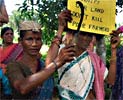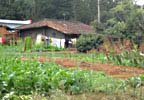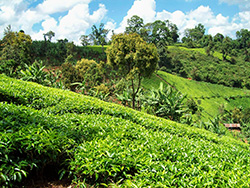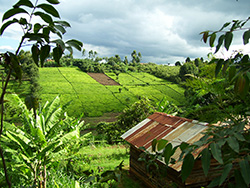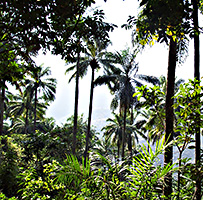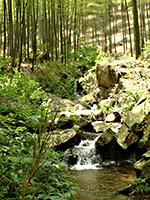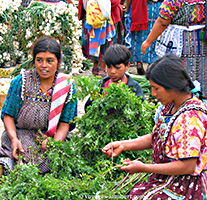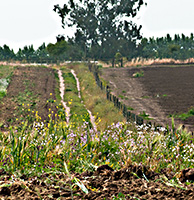A little village in Kenya – 1950
'The most beautiful land in the whole country'
Together they walk over the rolling landscape, a white man with a wide-brimmed hat on top of a red puffy face, and a black man, tall and lean, with three deep furrows on his forehead. They are both about the same age, around 55 years old. “How beautiful the land looks,” Mr. Howlands, the white man, says, and his eyes shine. With a large handkerchief he wipes the sweat from his forehead. “Yes indeed,” Ngotho answers, “this is the most beautiful land in the whole country.”
“Stephen has no feelings for the land,” the white man says to himself quietly, “will my son ever take over the plantation?” Ngotho's heart leaps with joy – will Mr. Howlands return to his country, far away? Will the prophecy of the great visionary Mugo wa Kibiro at long last be fulfilled? Will he finally get back his land?
When Ngotho was born, the British were already in control of his country. As a young man he was compelled to fight in 'the Great War.' Several times he narrowly escaped death. When he returned after the war, exhausted, his old father had been evicted from his land. It had gone into the hands of a white man, who, like himself, had fought in the war, and couldn't get his bearings in England any longer. Ngotho had become his farm hand. It was the only way to be on the land of his ancestors every day, and to stay in contact with his beloved spirits. Like a father and a mother at the same time, he takes care of the land, the trees and the shrubs. He loves the land. He is the trusted right hand man of Mr. Howlands.
Long, long ago, the great seer Mugo wa Kibiro had predicted that the whites would come, that they would step by step gain control of the land; but that one day they would return to their own country. That wisdom keeps Ngotho going. “Oh, Murungo, creator of the earth with everything that is living upon it,” the old man murmurs, “let it be that I always can go on caring for this land of my dear ancestors.”
_______________________
Source
The short novel Weep not, child (1964) from the Kenyan author Ngũgĩ wa Thiong’o describes the last years of the British colonisation.
Go to:
= the next page: The old fisherman - a fishing village on the coast of Cuba – 1951, story 112.
= the Table of contents, story 111.
